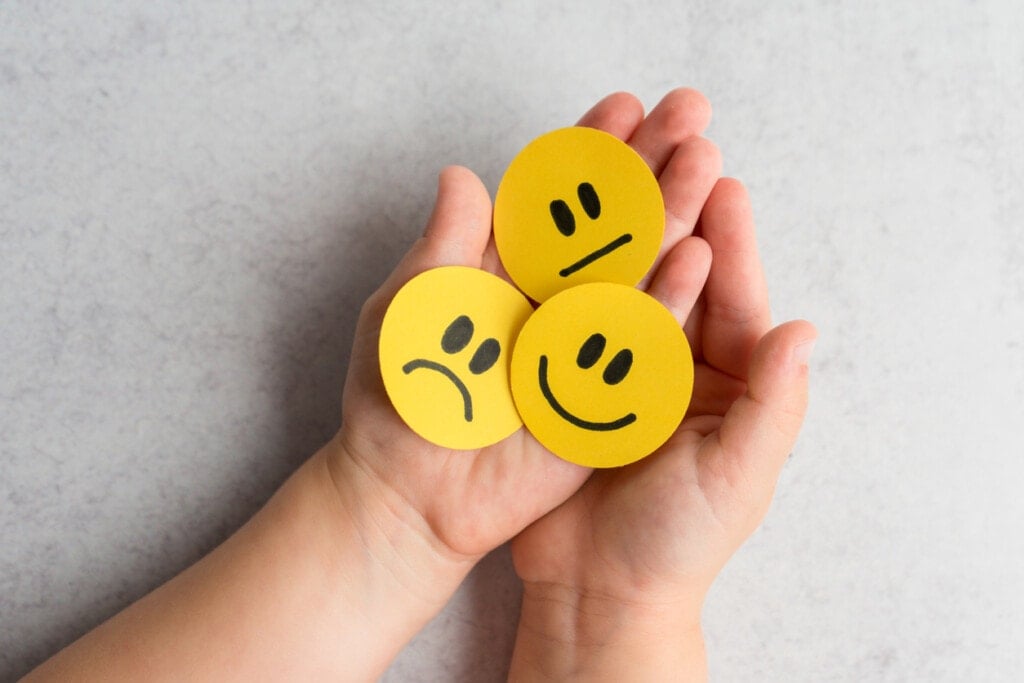When people think about mental health, there is often a misuse of and misunderstanding and stigma with the phrase “mental health,” which makes us focus only on adult problems. It’s also possible that people might not immediately make the connection that mental health also applies to our children.1
What is Mental Health?
Mental health refers to a person’s well-being and ability to cope with or manage stressors. When mental health is poor, it impacts our ability to live rewarding and productive lives. It may be confused or used interchangeably with the term mental illness, which can be an element of mental health but refers to specific conditions. There is a broad and varied range of mental health conditions. Still, in general, they are characterized by challenging or atypical emotions, behavior, and thoughts which may influence how people interact with them. Most mental health conditions are treatable, but it’s essential to note that they vary from person to person in terms of challenges, strengths, severity, length, and impact on quality of life.2,3
How Does Mental Health Impact Our Children?
Positive mental health in childhood refers to a child reaching expected emotional and physical milestones, engaging appropriately in the social world around them, and being resilient or able to cope with challenges or adverse life events. When children experience positive mental well-being, they also experience a good quality of life. They can function well and engage with the people and world around them, including families, educational settings, and the community.2
Mental health conditions in childhood may significantly influence how a child learns, behaves, and manages emotions. Challenges in these areas can create distress, disruptive behaviors, or problems managing their daily lives and interfere with their home life, relationships, or education. Children experiencing significant or persistent concerns may be diagnosed with a mental health condition. Considerable evidence shows that childhood mental health conditions predict mental illness in adulthood.4
Why Do Children Experience Mental Illness?
Many common mental health conditions can be influenced by economic, social, physical, and environmental factors, including trauma or adverse life events, violence, unemployment, homelessness, and a lack of stable, loving, or responsive relationships with caring adults. However, a genetic component can make some children more likely to experience mental health concerns. Some research shows that autism, bipolar disorder, and schizophrenia have heritability rates of 80% or higher. As well as the other influences, having a close family member with a mental health condition is the largest predictor of a child experiencing mental health concerns.2,3,5,6
What Should You Look For?
It’s critical to be on the lookout for either vulnerability or risk factors that could increase the likelihood of mental health conditions occurring. Children exposed to adverse life experiences, like social exclusion, lack of access to education, or poverty, are more likely to experience poorer mental health and well-being. Or these life factors could exacerbate pre-existing conditions. It doesn’t mean that these things “cause” mental health issues, but they can certainly have an influence.2,3
Children experience a wide range of emotions, and parents, caregivers, educators, and anyone working with children must understand that our little ones do not always display symptoms like grownups. They do not yet have the words or sometimes the ability to share their inner experience, including naming and understanding emotions so that we might notice some of the physical symptoms or challenges. These children might be labeled “naughty” or “worriers” because adults see the symptoms or outcomes of mental health challenges but don’t always connect the dots as to why they might occur. Children cannot advocate or explain these things to adults.
Emotional Regulation Struggles
We are not born knowing how to manage our big feelings, so children are expected to struggle to understand and regulate their emotions. However, when this lack of ability to self-regulate affects a child’s normal development, or they miss out on opportunities to engage in normal childhood activities, like play or education, it could be a sign that the child is vulnerable to or experiencing mental health concerns.
Specific things to look out for might include:7
- Intense struggles to regulate emotions, including outbursts and extreme reactions
- Difficulty maintaining or developing relationships
- Trouble calming down or controlling their needs
- Being separated from their caregiver beyond normal and expected development
- Sleep disturbance or changes to sleeping patterns
- Disordered eating or changes to eating patterns, including weight loss or gain
- Difficulty engaging in school or other educational activities
- Difficulty concentrating and paying attention
- Complaints of psychosomatic symptoms such as headaches or upset stomach
- Drastic changes to personality or mood
- Withdrawing from or avoiding social interactions
- Loss of interest in things they had previously enjoyed
- Hurting themselves or others, intentionally or incidentally, through behavior
- Talking about death or suicide
Also, be aware of experiences that can influence mental health and well-being and seek support from a relevant and appropriately skilled health professional in the aftermath of things like:1,8
- trauma
- loss of a loved one
- natural disasters
- exposure to family violence or direct experiences of abuse or neglect
- extended periods of separation from a primary caregiver
- poverty and periods of homelessness
- having a parent with an illness (mental or physical)
- exposure to substance or alcohol use (from a parent or primary caregiver)
Please note that these are only “factors” that can increase risk; they do not necessarily “cause” mental illness in children.
Diagnosing Mental Health Conditions in Children
If you notice any of the behaviors above or notice a marked change in your child’s behavior that is influencing their ability to get through or handle the day, their moods, their social and emotional development, or are just concerned in general about their well-being, you may want to engage a trusted health professional. A family doctor or pediatrician might be your first port of call, and they will usually conduct an evaluation which may include:10
- a medical exam
- medical history
- taking psycho-social (emotional/mental/developmental) and social history
- exploring family history of mental health concerns
- interviewing the parent or caregiver and the child (if appropriate)
- observe your child or try to watch the behaviors you are concerned about
Depending on their training in mental health, they may consider a diagnosis or refer your child for further evaluation to a specialist, like a psychologist, psychiatrist, or social worker. A diagnosis may also take time or could evolve because children often have difficulty understanding interview questions or expressing their feelings. Hence, refinement occurs over a period as the professional uncovers more information.
When considering a diagnosis, most health professionals use The Diagnostic and Statistical Manual of Mental Disorders to help them review symptoms and behaviors against criteria. Another commonly used diagnostic manual is the International Classification of Diseases (ICD) from the World Health Organization.7,11
Some common disorders occurring in children can be (but are not limited to):
- Anxiety
- Depression
- Post-traumatic stress disorder (PTSD)
- Oppositional defiance disorder (ODD)
- Attention-deficit/hyperactivity disorder (ADHD)
- Obsessive-compulsive disorder (OCD)
- Conduct disorder (CD)
- Tourette syndrome
- Eating disorders
Other conditions in childhood are not mental health conditions but can influence a child’s behavior, emotions, and learning, including developmental delays, autism, and substance use.
How Do Doctors Treat Mental Health Conditions in Children?
Common treatments are accessed via different and specialized mental health professionals, including:12, 13
Counseling and Psychotherapy
This therapy sometimes is called “talk therapy.” The treatment involves talking to a psychologist, psychiatrist, or other trained mental health professional. The therapy might include play or games the therapist interprets when working with young children. During sessions, children learn about their emotions, how to better regulate themselves, communicate their needs, and increase their coping and resilience.
Medication
Only appropriate healthcare professionals can recommend or prescribe medication. Medication will likely be only part of a treatment plan involving behavioral changes, support for the family, psychotherapy, etc. These can include stimulants, antidepressants, anti-anxiety or anti-psychotic medication, mood stabilizers, etc., and the treating professional should communicate the risks, side effects, benefits, and ways to use the medication properly.
Early Intervention is Important
It’s essential to understand that the earlier we intervene and seek support or put in place strategies, the better the outcomes for children. Early intervention also reduces the likelihood that mental health conditions will continue to impact a child into adolescence and beyond.2,3
Some ways we can support children include:14, 15
Don’t Delay Seeking Help
Services that you might engage in include primary health services (doctors and hospitals), school or education settings, and online services.
Involve the Family
Consider having the entire family in counseling or involve the family in the treatment planning. Have parents or primary caregivers receive support or attend training and development courses to improve their understanding and skills to support their child.
Get Input and Support from Key Stakeholders
This can be anyone involved in the child’s care, like teachers and childcare settings.
Focus on Secure Attachment and Strong Relationships
There is significant evidence that children who experience strong attachment with a primary caregiver in their early years are less likely to experience anxiety and better cope with life stressors and adverse events. Quality and stable relationships improve a child’s well-being, confidence, and skills to relate and engage with others. And there is evidence showing the relationships children experience with those around them shape and influence how their brains grow and function.2,9
Build the Child’s Resilience and Capacity to Cope
This includes improving emotional regulation skills, teaching them problem-solving skills, and helping them develop communication skills to navigate social situations and experience positive relationships.
Focus on the Child’s Strengths
Regardless of the diagnosis or challenges, each child will have skills and positives going for them. It’s easy to focus on what’s going wrong, but for everyone’s sake, it’s essential to reframe and redirect attention to include what works well.
Mental health in children can be pretty complex. Children exist in an “ecosystem,” and their health and development occur within multiple contexts surrounding them: their immediate families, extended families, neighborhood, school, and the community. Each level of these ecosystems interacts and influences one another and influences the child’s experiences. So, we must understand that we cannot view a child’s behavior or mental health in isolation. We must realize that these systems surrounding the child will influence their experience and contribute to their mental well-being and functioning.16
Their experiences might be positive or negative, nurturing or challenging. These experiences will affect the child differently depending on their vulnerability or pre-disposition for certain mental health conditions. Children’s mental health is dynamic, and their experience and functioning are not static, so their needs will evolve and change. Regardless of the complexity or factors which may have influenced a child, it is essential to consider prevention, early intervention, and engaging support to improve their outcomes not only now but into their future as they become adults.































